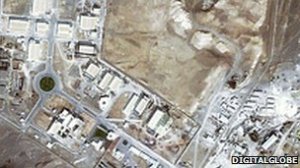By Kelsey Davenport
As talks between Iran and the P5+1 (China, France, Germany, Russia, the United Kingdom and the United States) resume in New York this week, myths and misconceptions about Iran's nuclear program still persist, and threaten to derail negotiations.
Until the Nov. 24 deadline, the Arms Control Association will publish a weekly post debunking some of the most commonly held "myths" about Iran's nuclear program and what a comprehensive agreement will seek to achieve.
 Iran's Natanz uranium enrichment facility (image source: BBC).
Iran's Natanz uranium enrichment facility (image source: BBC).
MISCONCEPTION: An Iranian uranium-enrichment program in a final nuclear agreement goes against U.S. policy on the right to enrich.
Although Iran and the P5+1 have yet to reach a comprehensive nuclear agreement, the parties have already agreed that Tehran will maintain a uranium-enrichment program as part of the final agreement.
The Nov. 24, 2013 Joint Plan of Action laid out the broad parameters for a final deal, including agreement by the United States and its partners that Iran would retain an enrichment program based on its "practical needs."
This has caused some concern that the United States has reversed its long standing policy opposing an inherent "right to enrich" under the nuclear Nonproliferation Treaty (NPT.) Iranian leaders making inaccurate statements that the agreement recognizes Iran's right adds to that confusion.
Acknowledging that a program exists, however, is not the same as acknowledging that a treaty affords a "right." The United States has done the former, not the latter. And, after reaching the agreement last November, U.S. Secretary of State John Kerry reiterated that U.S. policy remains unchanged by the agreement. In an interview with ABC he adamantly said, "there is no inherent right to enrich."
While the NPT clearly affords non-nuclear weapons states access to nuclear technology for peaceful purposes in return for pledging not to pursue nuclear weapons and having IAEA safeguards in place, it does not specifically afford or deny enrichment and reprocessing rights to member states.
This ambiguity is a cause of debate in the international community and amongst policymakers regarding the comprehensive nuclear agreement with Iran. Iran interprets the treaty to include a "right to enrich" and has insisted that its right to enrichment be respected under a nuclear agreement. And Iran is not alone; many other non-nuclear weapons states pursued enrichment or reprocessing because they interpret the NPT as giving them the "right" to do so. Countries like Argentina, Brazil, Germany, and Japan, all in good standing with the NPT, have pursued enrichment and/or plutonium reprocessing.
While allowing Iran an enrichment program may have come as a shock to some policymakers who advocated for total dismantlement, it should not have. Even prior to the Nov. 24 interim agreement, the United States said that Iran should be able to enrich uranium domestically under IAEA safeguards once the international concerns over its nuclear program are resolved. Former U.S. Secretary of State Hillary Clinton stated this position before the House Foreign Affairs Committee in March 2011.
In short, concerns that recognizing an Iranian uranium-enrichment program is a policy shift toward recognizing the "right to enrich" are unfounded, and other U.S. actions since the agreement support Kerry's words that U.S. policy does not recognize an inherent right to enrich.
